Seoul, Washington agree on July tariff deal framework in '2+2' trade talks
There were no discussions on defense cost-sharing and currency policies, according to the attending Korean ministers
By Apr 25, 2025 (Gmt+09:00)
LG Chem to sell water filter business to Glenwood PE for $692 million


KT&G eyes overseas M&A after rejecting activist fund's offer


Kyobo Life poised to buy Japan’s SBI Group-owned savings bank


StockX in merger talks with Naver’s online reseller Kream


Meritz backs half of ex-manager’s $210 mn hedge fund


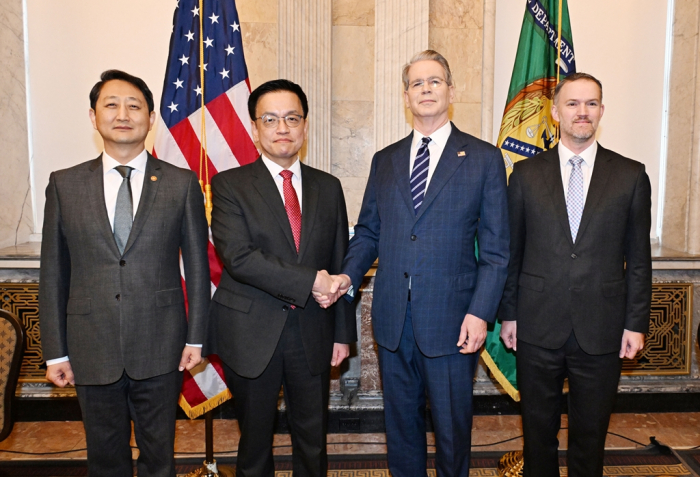
WASHINGTON, D.C. – South Korea and the US have agreed to work together to craft a comprehensive tariff-liberalization package by July 8, marking the first formal bilateral negotiations on trade barriers under the new Donald Trump administration.
Senior Korean officials, including Finance Minister Choi Sang-mok and Trade and Industry Minister Ahn Duk-geun, met with US Treasury Secretary Scott Besent and US Trade Representative (USTR) chief Jamieson Greer in Washington on Thursday for a “2+2” format meeting aimed at recalibrating the two allies’ economic and trade relations.
The meeting concluded with agreement to pursue what was dubbed the “July Package” – a roadmap to dismantle both reciprocal and sector-specific tariffs, with particular focus on automobiles, semiconductors, shipbuilding and liquefied natural gas (LNG).
The two sides also discussed broader economic security cooperation, including investment frameworks and currency policy, according to the Korean government.
“Today we conveyed Korean people’s deep concerns over the reciprocal and itemized tariffs imposed by the US and reiterated Korea’s position as a trusted partner,” said Choi at a press briefing at the Korean embassy in Washington.
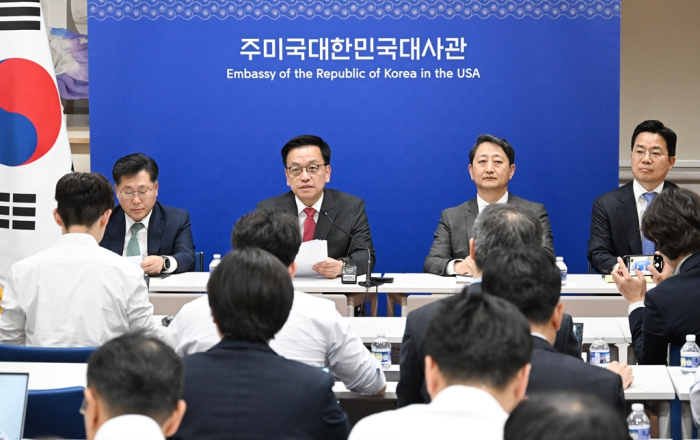
Seoul emphasized the potential negative economic impact of the US tariffs on imported vehicles, in particular, he said.
‘THEY BROUGHT THEIR A GAME’
The 2+2 talks reflect a shift in US trade posture as President Trump’s team reengages key trading partners with a more transactional approach focused on US industry gains.
Greer is expected to visit Seoul next month for the APEC Trade Ministers’ Meeting, which kicks off on May 15 for a two-day run, during which additional high-level consultations are planned, according to Korean government officials.
Greer and Ahn also met separately later on Thursday, agreeing to set up multiple working groups to address technical and sectoral issues, laying the groundwork for a potential memorandum of understanding as early as next week, government sources said.
“They brought their A game,” Secretary Bessent told reporters after a meeting at the White House with Norwegian Prime Minister Jonas Gahr Støre, signaling US satisfaction with Korea’s proposals.
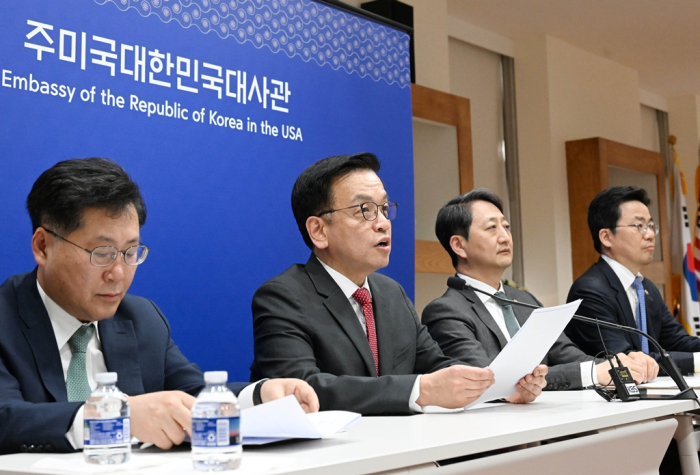
MEASURED, ORDERLY NEGOTIATIONS
Korea's strategy, according to Choi, is driven by the need for “measured and orderly” negotiations, given the ongoing domestic political transition.
“It is difficult to rush a final agreement given the legislative and regulatory processes involved,” he said. “Still, Seoul is determined to secure tangible progress before the current reciprocal tariff waiver expires on July 8.”
Korea is set for an early presidential election on June 3, after former President Yoon Suk Yeol’s impeachment stemming from his short-lived martial law declaration on Dec. 3, which triggered a sharp, months-long divide between his supporters and opponents.
Analysts said domestic political uncertainty is adding to Korea’s economic drag.
NO DISCUSSION OF DEFENSE COST-SHARING
Trade Minister Ahn outlined Korea’s push for a reciprocal removal of tariffs in sectors such as energy security, particularly LNG, and shipbuilding – business areas the US is keen to revitalize for its own economic growth.
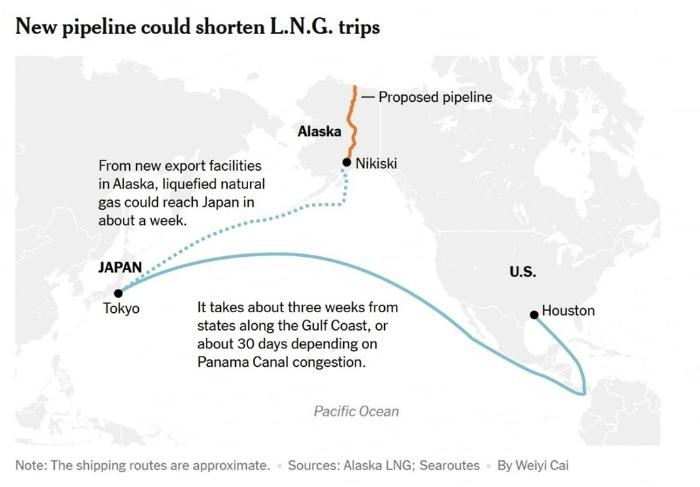
“We proposed mutually beneficial pathways, including sustainable trade practices and joint investment in US shipbuilding capacity,” Ahn said, hinting at alignment with the Trump administration’s broader industrial agenda.
The issue of currency policy also featured prominently, with both governments agreeing to address it through separate consultations between their respective finance ministries. Choi said that Bessent initiated the topic, though no specifics were disclosed.
Notably absent from the talks was any discussion of defense cost-sharing, a contentious issue in prior bilateral engagements.
When asked whether Korea’s acting President Han Duck-soo or other senior government officials had provided strategic guidance, Choi said, “There was none.”
ALASKA LNG PROJECT
The 2+2 talks come as US pressure mounts on Korea and Japan to invest in the $44 billion Alaska LNG project – a cornerstone of President Trump’s energy strategy.
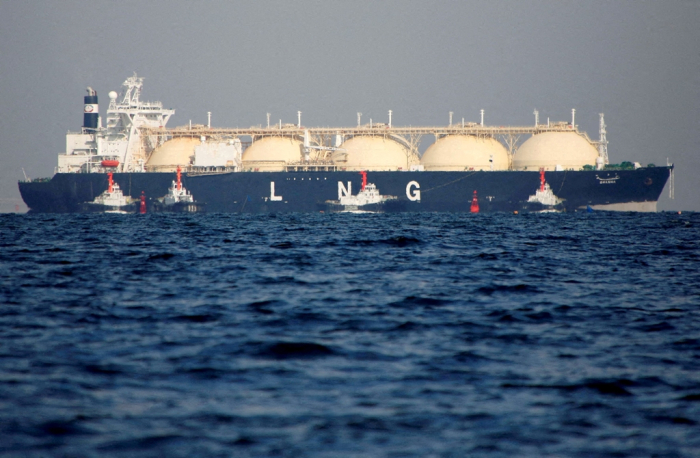
According to the New York Times, the White House aims to secure letters of intent from Seoul and Tokyo at a June 2 energy summit in Alaska. Taiwan reportedly signed a similar commitment last month. However, Minister Ahn said no such request had been made during this week’s talks.
Bessent, meanwhile, remained bullish on the trajectory of negotiations.
“We’re moving faster than I thought we could,” he told reporters. “We may reach an agreement on understanding as early as next week and start detailing the technical terms.”
The precise content of those technical terms remains unclear. Ahn noted that Bessent’s language diverged from traditional trade diplomacy and suggested that more concrete details will emerge in forthcoming USTR releases.
The atmosphere, Choi stressed, was constructive. “This was the first official consultation on tariff policy between our two nations, and it proceeded in a friendly and positive tone. We expect further working-level discussions and high-level engagements to follow.”
Write to Sang-eun Lucia Lee at selee@hankyung.com
In-Soo Nam edited this article.
-
 EarningsHyundai Motor posts solid Q1; rough road ahead on Trump's auto tariffs
EarningsHyundai Motor posts solid Q1; rough road ahead on Trump's auto tariffsApr 24, 2025 (Gmt+09:00)
4 Min read -
 Business & PoliticsS.Korea's Han, Trump discuss transactional diplomacy in 1st direct talks
Business & PoliticsS.Korea's Han, Trump discuss transactional diplomacy in 1st direct talksApr 09, 2025 (Gmt+09:00)
3 Min read -
 EarningsSamsung’s Q1 profit beats expectations; Q2 outlook murky on tariff war
EarningsSamsung’s Q1 profit beats expectations; Q2 outlook murky on tariff warApr 08, 2025 (Gmt+09:00)
3 Min read -
 Korean stock marketSouth Korean stocks, currency dive amid deeper US tariff turmoil
Korean stock marketSouth Korean stocks, currency dive amid deeper US tariff turmoilApr 07, 2025 (Gmt+09:00)
3 Min read -
 Business & PoliticsSamsung, LG review strategies as Trump slaps Vietnam with steeper tariffs
Business & PoliticsSamsung, LG review strategies as Trump slaps Vietnam with steeper tariffsApr 03, 2025 (Gmt+09:00)
5 Min read -
 Business & PoliticsS.Korea wary of inclusion on US ‘Dirty 15’ nations list for reciprocal tariffs
Business & PoliticsS.Korea wary of inclusion on US ‘Dirty 15’ nations list for reciprocal tariffsMar 19, 2025 (Gmt+09:00)
3 Min read -
 Business & PoliticsTrump says Korea interested in Alaska gas project; Korean firms skeptical
Business & PoliticsTrump says Korea interested in Alaska gas project; Korean firms skepticalMar 05, 2025 (Gmt+09:00)
3 Min read


